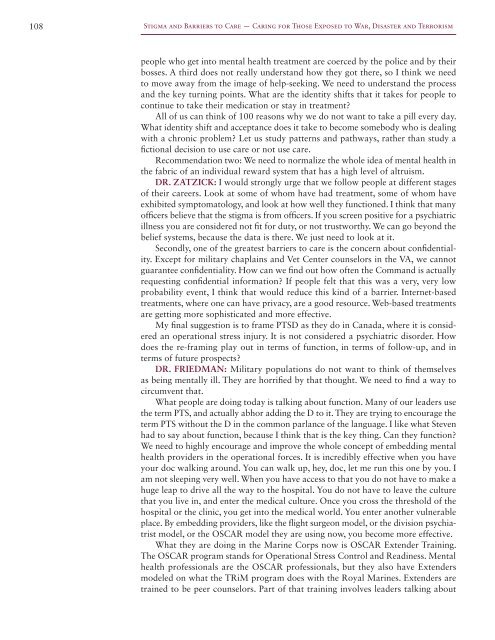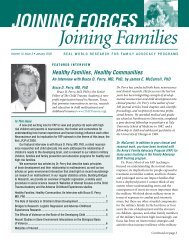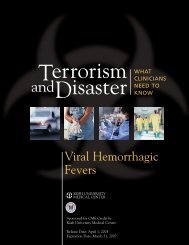stigma and barriers to care - Uniformed Services University of the ...
stigma and barriers to care - Uniformed Services University of the ...
stigma and barriers to care - Uniformed Services University of the ...
Create successful ePaper yourself
Turn your PDF publications into a flip-book with our unique Google optimized e-Paper software.
108<br />
Stigma <strong>and</strong> Barriers <strong>to</strong> Care — Caring for Those Exposed <strong>to</strong> War, Disaster <strong>and</strong> Terrorism<br />
people who get in<strong>to</strong> mental health treatment are coerced by <strong>the</strong> police <strong>and</strong> by <strong>the</strong>ir<br />
bosses. A third does not really underst<strong>and</strong> how <strong>the</strong>y got <strong>the</strong>re, so I think we need<br />
<strong>to</strong> move away from <strong>the</strong> image <strong>of</strong> help-seeking. We need <strong>to</strong> underst<strong>and</strong> <strong>the</strong> process<br />
<strong>and</strong> <strong>the</strong> key turning points. What are <strong>the</strong> identity shifts that it takes for people <strong>to</strong><br />
continue <strong>to</strong> take <strong>the</strong>ir medication or stay in treatment<br />
All <strong>of</strong> us can think <strong>of</strong> 100 reasons why we do not want <strong>to</strong> take a pill every day.<br />
What identity shift <strong>and</strong> acceptance does it take <strong>to</strong> become somebody who is dealing<br />
with a chronic problem Let us study patterns <strong>and</strong> pathways, ra<strong>the</strong>r than study a<br />
fictional decision <strong>to</strong> use <strong>care</strong> or not use <strong>care</strong>.<br />
Recommendation two: We need <strong>to</strong> normalize <strong>the</strong> whole idea <strong>of</strong> mental health in<br />
<strong>the</strong> fabric <strong>of</strong> an individual reward system that has a high level <strong>of</strong> altruism.<br />
DR. ZATZICK: I would strongly urge that we follow people at different stages<br />
<strong>of</strong> <strong>the</strong>ir <strong>care</strong>ers. Look at some <strong>of</strong> whom have had treatment, some <strong>of</strong> whom have<br />
exhibited symp<strong>to</strong>ma<strong>to</strong>logy, <strong>and</strong> look at how well <strong>the</strong>y functioned. I think that many<br />
<strong>of</strong>ficers believe that <strong>the</strong> <strong>stigma</strong> is from <strong>of</strong>ficers. If you screen positive for a psychiatric<br />
illness you are considered not fit for duty, or not trustworthy. We can go beyond <strong>the</strong><br />
belief systems, because <strong>the</strong> data is <strong>the</strong>re. We just need <strong>to</strong> look at it.<br />
Secondly, one <strong>of</strong> <strong>the</strong> greatest <strong>barriers</strong> <strong>to</strong> <strong>care</strong> is <strong>the</strong> concern about confidentiality.<br />
Except for military chaplains <strong>and</strong> Vet Center counselors in <strong>the</strong> VA, we cannot<br />
guarantee confidentiality. How can we find out how <strong>of</strong>ten <strong>the</strong> Comm<strong>and</strong> is actually<br />
requesting confidential information If people felt that this was a very, very low<br />
probability event, I think that would reduce this kind <strong>of</strong> a barrier. Internet-based<br />
treatments, where one can have privacy, are a good resource. Web-based treatments<br />
are getting more sophisticated <strong>and</strong> more effective.<br />
My final suggestion is <strong>to</strong> frame PTSD as <strong>the</strong>y do in Canada, where it is considered<br />
an operational stress injury. It is not considered a psychiatric disorder. How<br />
does <strong>the</strong> re-framing play out in terms <strong>of</strong> function, in terms <strong>of</strong> follow-up, <strong>and</strong> in<br />
terms <strong>of</strong> future prospects<br />
DR. FRIEDMAN: Military populations do not want <strong>to</strong> think <strong>of</strong> <strong>the</strong>mselves<br />
as being mentally ill. They are horrified by that thought. We need <strong>to</strong> find a way <strong>to</strong><br />
circumvent that.<br />
What people are doing <strong>to</strong>day is talking about function. Many <strong>of</strong> our leaders use<br />
<strong>the</strong> term PTS, <strong>and</strong> actually abhor adding <strong>the</strong> D <strong>to</strong> it. They are trying <strong>to</strong> encourage <strong>the</strong><br />
term PTS without <strong>the</strong> D in <strong>the</strong> common parlance <strong>of</strong> <strong>the</strong> language. I like what Steven<br />
had <strong>to</strong> say about function, because I think that is <strong>the</strong> key thing. Can <strong>the</strong>y function<br />
We need <strong>to</strong> highly encourage <strong>and</strong> improve <strong>the</strong> whole concept <strong>of</strong> embedding mental<br />
health providers in <strong>the</strong> operational forces. It is incredibly effective when you have<br />
your doc walking around. You can walk up, hey, doc, let me run this one by you. I<br />
am not sleeping very well. When you have access <strong>to</strong> that you do not have <strong>to</strong> make a<br />
huge leap <strong>to</strong> drive all <strong>the</strong> way <strong>to</strong> <strong>the</strong> hospital. You do not have <strong>to</strong> leave <strong>the</strong> culture<br />
that you live in, <strong>and</strong> enter <strong>the</strong> medical culture. Once you cross <strong>the</strong> threshold <strong>of</strong> <strong>the</strong><br />
hospital or <strong>the</strong> clinic, you get in<strong>to</strong> <strong>the</strong> medical world. You enter ano<strong>the</strong>r vulnerable<br />
place. By embedding providers, like <strong>the</strong> flight surgeon model, or <strong>the</strong> division psychiatrist<br />
model, or <strong>the</strong> OSCAR model <strong>the</strong>y are using now, you become more effective.<br />
What <strong>the</strong>y are doing in <strong>the</strong> Marine Corps now is OSCAR Extender Training.<br />
The OSCAR program st<strong>and</strong>s for Operational Stress Control <strong>and</strong> Readiness. Mental<br />
health pr<strong>of</strong>essionals are <strong>the</strong> OSCAR pr<strong>of</strong>essionals, but <strong>the</strong>y also have Extenders<br />
modeled on what <strong>the</strong> TRiM program does with <strong>the</strong> Royal Marines. Extenders are<br />
trained <strong>to</strong> be peer counselors. Part <strong>of</strong> that training involves leaders talking about




